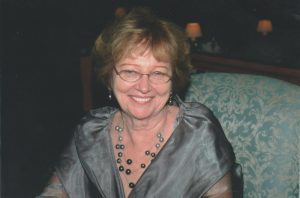The Oral History Center has been conducting a series of interviews about SLATE, a student political party at UC Berkeley from 1958 to 1966 – which means SLATE pre-dates even the Free Speech Movement. The newest addition to this project is an oral history with JoAnn Fowler, who was a founding member of the organization in the late 1950s.

JoAnn Fowler is a retired Spanish language educator and was a founding member of the University of California, Berkeley student political organization SLATE in the late 1950s. Fowler grew up in Los Angeles, California. She attended UC Berkeley from 1955 to 1959, where she became active in SLATE and served in student government through Associated Students of the University of California (ASUC). After completing a master’s degree at Columbia University, she worked as a teacher, mostly in Davis, California. Find this interview and all our oral histories from the search feature on our home page. You can search by name, key word, and several other criteria.
I have previously written about the contributions of women members of SLATE and their sometimes complicated feelings about gender roles in this student political group. Fowler, however, did not feel that being a woman was not an obstacle for her in SLATE, and her interview includes memories of her own role in shaping the organization.
Fowler recalls being an outspoken SLATE member from the start. At her first meeting with the group in the fall of 1957, she recalled being overwhelmed by the advanced political theory many of the group discussed, and by one faction that she perceived “wanted to sit around and talk these things to death and not try to take any kind of action.” She felt that in order to be politically effective, the group had to take another approach:
I’m very verbal, I’m not shy at all, I speak right up, I don’t care, I have nothing to lose here. I say that, “You have to do something within the campus, you have to work within the campus. If you want to get all these things done, you have to get elected and do things on campus.”…So that’s the position I take, and that’s the position that Pat Hallinan takes, and so we win over the majority of these people…
Perhaps Fowler’s greatest contribution to the group was that in the spring of 1958 she ran for and won a position with ASUC on the SLATE ticket. This made Fowler and Mike Gucovsky the first SLATE members to have a voice in student government at UC Berkeley, and being able to affect progressive political change from positions of campus leadership was a key goal of the group. In speaking of her campaign platform, Fowler remembered:
If you were to name anything, we ran on all of it, but not all of that could be addressed during the campaign. Basically, it was: freedom of speech was addressed through [being] against the [House] Un-American Activities Committee and also by the relationship between professors and the students that should be confidential and the anti-Loyalty Oath. Then there was civil liberties in the South; in Berkeley with that housing ordinance that came up for vote; and on the campus that no fraternity or sorority should discriminate.
She continued discussion of that ASUC campaign, saying:
This was encouraged by Mike Miller. I didn’t mind running—that was going to be great—but I did mind speaking to big groups. I hadn’t had a lot of experience doing that, so he encouraged me to do that. I went around only two nights that I remember, and it was only to men—I never spoke to women—and only at the co-ops. That was my background; I’d come out of co-ops. I’d go in at dinnertime and I would speak for two minutes, maybe somebody introduced me and maybe somebody didn’t. I’d speak for two minutes to those very immediate concerns that I thought would be very appealing, and I would have this overwhelming applause. But I felt that anybody, any woman could have stood up there and gotten this overwhelming applause, because that’s the kind of applause I felt it was. I don’t know, maybe that’s just me. I don’t know who else spoke there. I don’t know if men spoke there, if other independents have reached out, I have no idea.
Even after she graduated from UC Berkeley in 1959, the lessons she learned from SLATE stayed with her. While living in Davis, she worked at a Hunt’s tomato factory, where she attempted to organize the office workers. Later, she headed the Davis Teachers Association, supporting a raise in teachers’ salaries. These organizing efforts didn’t always succeed, but Fowler saw them as part of a larger political project she’d been passionate about since her time in college. She explained, “But I did my bit, and so without SLATE, I wouldn’t have…tried, no, I wouldn’t have tried.”
Reflecting on how her involvement with SLATE impacted her life, Fowler observed:
I think it was one of the greatest experiences of my life. I never would have been as politically aware. I didn’t have that background, I didn’t take political science, I didn’t take sociology; I took economics, I took psychology. I never would have been as aware or as active as I was, I wouldn’t have had a group. When I lived in an apartment, I didn’t have a social group or I didn’t have—you were going to come on campus and leave campus because you certainly didn’t meet too many people coming out of that lecture hall of 500 people. I’m glad I have that experience, very much so. It was a good time in my life.
To learn more about JoAnn Fowler’s life and political work, check out her oral history! Find this interview and all our oral histories from the search feature on our home page. You can search by name, key word, and several other criteria.